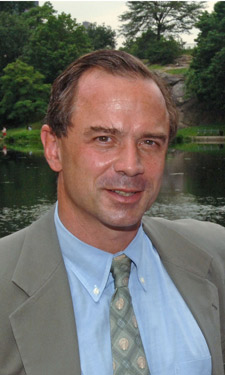 Adrian Benepe,
the highly respected and sometimes controversial commissioner of parks and
recreation for New York City, is leaving after four-plus decades of service to New
York City to take a position with the Trust for Public Land heading up its
urban parks national programs. Mayor Michael Bloomberg says of Benepe: “Adrian Benepe
has done extraordinary work as parks commissioner leading transformative changes
in every corner of New York City, and I couldn’t be prouder that he is going to
lead the Trust for Public Land’s new initiative to replicate our work in cities
across the country.”
Adrian Benepe,
the highly respected and sometimes controversial commissioner of parks and
recreation for New York City, is leaving after four-plus decades of service to New
York City to take a position with the Trust for Public Land heading up its
urban parks national programs. Mayor Michael Bloomberg says of Benepe: “Adrian Benepe
has done extraordinary work as parks commissioner leading transformative changes
in every corner of New York City, and I couldn’t be prouder that he is going to
lead the Trust for Public Land’s new initiative to replicate our work in cities
across the country.”
Beginning in 1973, at the age of 16 as a part-time employee, Benepe held a variety of progressively more responsible jobs at the Department of Parks and Recreation. His first full-time job was with the department as one of the city’s first Urban Park Rangers. Though he left the department for two related positions during his time at DPR, he returned twice, eventually becoming commissioner in 2002. His many years of service, especially his time as commissioner, constitute a remarkable legacy of achievement for parks and recreation.
Some of his accomplishments have been compared favorably with the legendary visionary urban planner and former Commissioner Robert Moses. Under Benepe’s tenure, the sprawling Department of Parks and Recreation grew to more than 1,700 parks and 29,000 acres of parkland. He was responsible for overseeing some of the most iconic parks in America, including the renewal of Central Park and Prospect Park, as well as the upkeep and operation of nearly 1,000 public playgrounds, 30 outdoor swimming pools, and hundreds of other traditional and non-traditional facilities and urban parks.
Among his most noteworthy accomplishments, Benepe managed the largest expansion of the city’s waterfront parks in history as well as the largest expansion of the park system since the 1930s. He developed new public/private partnerships that revitalized some of the city’s most historic parks, and helped to create private sector partnerships, which annually raise more than $150 million for the parks. While some have accused him of privatizing parks, he was at the forefront of the creation of many new entities and partnerships that brought new resources and parks to the system, such as the development of the High Line, a converted industrial rail line that has spurred nearly $2 billion in adjacent private sector development, and the Brooklyn Bridge Waterfront Park, one of the city’s newest waterfront parks. He led the way for many of Bloomberg’s signature initiatives, including the One Million Tree planting project and many environmental elements of PLANYC, the city’s long-term sustainability plan.
Benepe also has an eagle eye for detail as well big-picture thinking, and many a staff member was the recipient of a call or email as he followed up on detailed notes taken on numerous travels through the park system. He had a deep and abiding commitment to youth, especially to ensuring that youngsters learned how to swim, and he can be credited with being responsible for the many learn-to-swim programs that NYC DPR conducts.
“Adrian is the king of how to do more with less,” says Tupper Thomas, former administrator of Prospect Park, and founding member of the City Parks Alliance. “He creatively put together partnerships, found unique sources of funding, and was a true leader of the department, creating a ‘can do’ attitude in the staff. “He acquired more parkland than anyone before him and put together more capital funding than had ever been put together before; but beyond that, he had a great sense of design,” Thomas continues. “And, he added sustainability measures, maintained parks better, and improved the environmental quality of parks better than anyone has before him.”
Benepe will begin work in his new position as senior vice president for city park development with the Trust for Public Land in early September.
“I will be working to seek out and promulgate best practices from cities across the country, toward the ultimate goal of helping cities create new parks as well as improve existing parks,” Benepe says.
He also looks forward to working with the TPL board and staff as well to working with elected offi cials, parks advocates, and funders to advance new initiatives for health, greenways, and sustainable landscapes that manage stormwater effectively.
“I look forward to partnering with NRPA members, especially those from urban park systems,” Benepe says.

